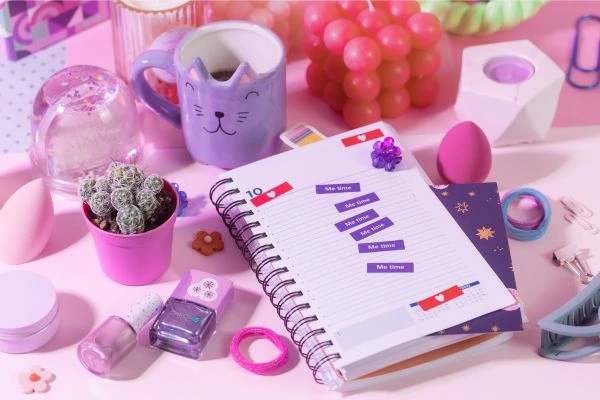Almost all therapists suggest journaling as an amazing way to unload your mind.
Each of us goes through things we don’t talk about.
Sometimes it’s because we can’t, and at other times, the sheer fear of our vulnerabilities being used against us halts us in our way.
That’s why we have journals.
Are you beginning your journaling journey?
We’ve got you.
We bring to you a well researched article on where to begin your journaling journey.
How to Start a Journal: Beginner-Friendly Guide to Get Started
1. Choose Your Medium: Paper, Digital, or Both
Before writing anything, decide how you want to journal. Traditionalists might love a physical notebook, while others may prefer typing into apps like Notion, Day One, or even Google Docs.
There’s no “better” option — it’s about what feels natural and convenient for you. If you’re unsure, try both and see which one encourages more consistency. The goal is to remove friction, not create more of it.
2. Set a Comfortable Mood and Space
Journaling is more than writing — it’s a vibe. Create a comfortable, non-distracting environment: soft lighting, a warm drink, maybe a playlist or total silence.
The cozier your setup, the more likely you’ll return to it. You don’t need a Pinterest-perfect corner, just a space that feels safe and grounding. Your environment sets the emotional tone for your entries.
3. Start Small — Like, Really Small
Your first journal entry doesn’t have to be deep or poetic. Start with just 2–5 minutes a day or one simple sentence: “Today, I feel…” or “Right now, I’m thinking about…”
The point is to build the habit gently, without pressure to be profound. Over time, it’ll naturally become more reflective and personal. Consistency > complexity.
4. Use Prompts If You’re Stuck
Feeling blocked? Prompts are your best friend. Questions like “What’s been on my mind lately?” or “What made me smile today?” give you something concrete to respond to.
There are thousands of journaling prompts out there for mental health, creativity, healing, and productivity. Start with a list and pick one each day until writing feels more natural.
5. Be Honest, Not Impressive
This journal is for you, not your English teacher or Instagram. Write how you speak. Be messy. Say the wrong thing. Honesty creates clarity — and journaling is your safe space to explore what’s real, raw, or unresolved. Vulnerability is the real magic here, not grammar or structure.
6. Don’t Overthink Structure or Format
There’s no rulebook for journaling. You don’t need perfect handwriting, dated pages, or consistent paragraphs. Your journal can be bullet points, lists, brain dumps, poems, or doodles — whatever helps you process.
The only “right” way is the one that works for you. Free yourself from needing it to “look good.”
7. Choose a Time That Fits Your Rhythm
Some people journal best in the quiet of morning, others prefer bedtime reflection. Experiment with when journaling feels most natural in your day — and attach it to an existing habit (like after coffee or before sleep).
Creating a gentle routine around it makes journaling less of a task and more of a ritual. Your timing can change daily — just be intentional.
8. Try Themed Journaling Days
If variety helps you stay consistent, give each day a theme. For example:
-
Monday = Gratitude
-
Tuesday = Venting
-
Wednesday = Goal check-in
This keeps journaling interesting and helps you explore different parts of yourself. It’s a great tool to avoid the “what do I even write about?” spiral.
9. Reflect — Don’t Just Record
Journaling isn’t just about logging events — it’s about learning from them. Instead of just writing what happened, try exploring why it mattered or how you felt.
Ask yourself, “What did this teach me?” or “How do I want to move forward?” This adds depth and makes journaling a tool for self-awareness, not just storytelling.
10. Make It Yours — Break the Rules If You Need To
Hate daily journaling? Don’t do it daily. Prefer drawing or voice notes? Go for it. Want to skip a week? Totally fine. Journaling should support your mental and emotional health, not stress you out. Customize it until it feels right — this is your space, and it evolves with you.
Do’s and Don’ts of Journaling
✅ Do’s:
-
Be consistent, not perfect — even a few lines matter.
-
Write for yourself, not an imaginary audience.
-
Use prompts when your mind is blank.
-
Revisit past entries to see growth over time.
-
Keep your journal private or protected so you can be 100% honest.
❌ Don’ts:
-
Don’t censor yourself — let it be messy, emotional, real.
-
Don’t force it daily if that stresses you out.
-
Don’t focus on spelling or grammar — this is not a writing contest.
-
Don’t compare your journaling to others — your voice is enough.
-
Don’t judge your thoughts — observe them with curiosity, not shame.
See Also:
-
Aesthetic About Me Journal Page Ideas (For Beginners, Must Try)
-
Back to School Journal Prompts for Kids (Reflective, Creative & Teacher-Approved)
-
Inspiring Christian Journal Prompts (To Bring You Closer to God, for Spiritual Growth)
Feeling overwhelmed?
Don’t worry!! We have your back.






